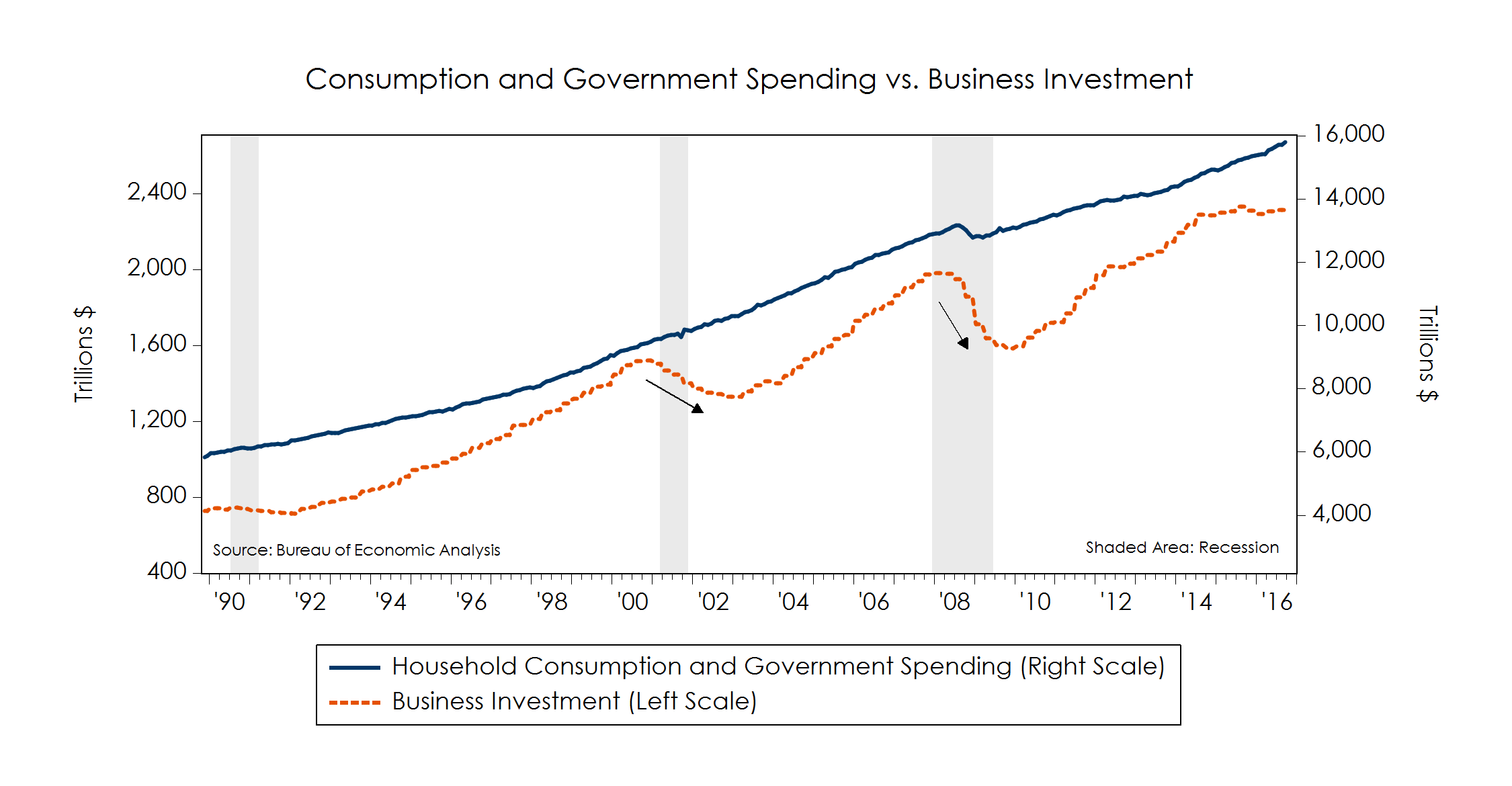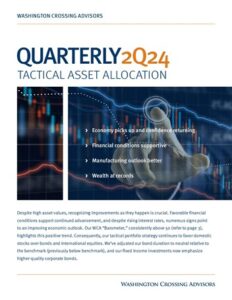Monday Morning Minute 022717
THE WEEK AHEAD
We expect good reports this way on durable goods and manufacturing this week, consistent with other recent data points. The improvement in the business outlook is being clearly embedded in market expectations.
MACRO VIEW
It has been more than 90 months since the last recession. Expected tax cuts, infrastructure spending, and regulation are fueling consumer and business optimism. In turn, this optimism is helping lift the stock market to records. Given this, we want to spend a minute to remind ourselves how we got here.
During the ’07-09 recession, the U.S. stock market had an average value of about $13.4 trillion. The economy, meanwhile, produced average annualized output near $14.6 trillion. Today, the U.S. stock market is valued at $26.5 trillion and sits atop a $18.8 trillion economy. In other words, today’s market valuation is relatively high compared to the economy.
What drove the turnaround and sustained the momentum from the dark days of 2009? In our view, it was the combination of steady growth in demand generated first by government and continued by consumers (chart below). The chart below shows just how steady the combination of government and consumption growth has been. Since the end of the recession, consumption and government spending increased $2.9 trillion. By contrast, business investment increased $670 billion.
Another important thing to note from the graph is just how steady the combined mix of household consumption and government has been. Rarely has the sum total of these parts of the economy contracted. By contrast, business investment tends to be far more fickle. Such investment tends to fall sharply at the advent of recession.
As you can see, the consumer carries most of the water for the economy most of the time, and does so consistently. We expect steady numbers on consumer income and spending this week, alongside a strong showing for durable goods (Monday) and manufacturing PMI (Wednesday)..
ECONOMIC RELEASES THIS WEEK
| Date | Report | Period | Survey | Prior |
| Monday, Feb 27: | Durable Goods Orders | Jan | 2.0% | -0.5% |
| Durables Ex Transportation | Jan | 0.5% | 0.5% | |
| Cap Goods Orders Nondef Ex Air | Jan | 0.5% | 0.7% | |
| Cap Goods Ship Nondef Ex Air | Jan | — | 1.0% | |
| Pending Home Sales M/M | Jan | 0.9% | 1.6% | |
| Pending Home Sales Y/Y | Jan | — | -2.0% | |
| Tuesday, Feb 28: | GDP Annualized Q/Q | 4Q16 | 2.1% | 1.9% |
| Advance Goods Trade Balance | Jan | -$66 B | -$65 B | |
| S&P Case-Shiller HPI M/M | Dec | 0.7% | 0.9% | |
| S&P Case-Shiller HPI Y/Y | Dec | — | 5.3% | |
| Chicago PMI | Feb | 53.0 | 50.3 | |
| Consumer Confidence | Feb | 111.0 | 111.8 | |
| Wednesday, Mar 1: | Personal Income | Jan | 0.3% | 0.3% |
| Personal Spending | Jan | 0.3% | 0.5% | |
| ISM Manufacturing Index | Feb | 55.8 | 56.0 | |
| Domestic Vehicle Sales | Feb | — | 13.6 M | |
| Total Vehicle Sales | Feb | 17.6 M | 17.5 M | |
| PMI Manufacturing Index | Feb | — | 54.3 | |
| Construction Spending | Jan | 0.7% | -0.2% | |
| Fed Beige Book | ||||
| Thursday, Mar 2: | Weekly Jobless Claims | 2/25 | — | 244 K |
| Friday, Mar 3: | ISM Non-Manufacturing Index | Feb | 56.5 | 56.5 |
| Source: Bloomberg |
ASSET ALLOCATION PORTFOLIO POSTURE
Based on shorter-term expectations, the “tactical” allocation within portfolios is underweight bonds / overweight stocks.
Kevin Caron, CFA®, Portfolio Manager
Chad Morganlander, Portfolio Manager
Matthew Battipaglia, Analyst
Suzanne Ashley, Junior Analyst
——————————————————————————————————————————————————
Disclosures
WCA Fundamental Conditions Barometer Description: We regularly assess changes in fundamental conditions to help guide near-term asset allocation decisions. The analysis incorporates approximately 30 forward-looking indicators in categories ranging from Credit and Capital Markets to U.S. Economic Conditions and Foreign Conditions. From each category of data, we create three diffusion-style sub-indices that measure the trends in the underlying data. Sustained improvement that is spread across a wide variety of observations will produce index readings above 50 (potentially favoring stocks), while readings below 50 would indicate potential deterioration (potentially favoring bonds). The WCA Fundamental Conditions Index combines the three underlying categories into a single summary measure. This measure can be thought of as a “barometer” for changes in fundamental conditions.
The information contained herein has been prepared from sources believed to be reliable but is not guaranteed by us and is not a complete summary or statement of all available data, nor is it considered an offer to buy or sell any securities referred to herein. Opinions expressed are subject to change without notice and do not take into account the particular investment objectives, financial situation, or needs of individual investors. There is no guarantee that the figures or opinions forecasted in this report will be realized or achieved. Employees of Stifel, Nicolaus & Company, Incorporated or its affiliates may, at times, release written or oral commentary, technical analysis, or trading strategies that differ from the opinions expressed within. Past performance is no guarantee of future results. Indices are unmanaged, and you cannot invest directly in an index.
Asset allocation and diversification do not ensure a profit and may not protect against loss. There are special considerations associated with international investing, including the risk of currency fluctuations and political and economic events. Investing in emerging markets may involve greater risk and volatility than investing in more developed countries. Due to their narrow focus, sector-based investments typically exhibit greater volatility. Small company stocks are typically more volatile and carry additional risks, since smaller companies generally are not as well established as larger companies. Property values can fall due to environmental, economic, or other reasons, and changes in interest rates can negatively impact the performance of real estate companies. When investing in bonds, it is important to note that as interest rates rise, bond prices will fall. High-yield bonds have greater credit risk than higher-quality bonds. The risk of loss in trading commodities and futures can be substantial. You should therefore carefully consider whether such trading is suitable for you in light of your financial condition. The high degree of leverage that is often obtainable in commodity trading can work against you as well as for you. The use of leverage can lead to large losses as well as gains.
All investments involve risk, including loss of principal, and there is no guarantee that investment objectives will be met. It is important to review your investment objectives, risk tolerance and liquidity needs before choosing an investment style or manager. Equity investments are subject generally to market, market sector, market liquidity, issuer, and investment style risks, among other factors to varying degrees. Fixed Income investments are subject to market, market liquidity, issuer, investment style, interest rate, credit quality, and call risks, among other factors to varying degrees.
This commentary often expresses opinions about the direction of market, investment sector and other trends. The opinions should not be considered predictions of future results. The information contained in this report is based on sources believed to be reliable, but is not guaranteed and not necessarily complete.
Washington Crossing Advisors LLC is a wholly owned subsidiary and affiliated SEC Registered Investment Adviser of Stifel Financial Corp (NYSE: SF).




